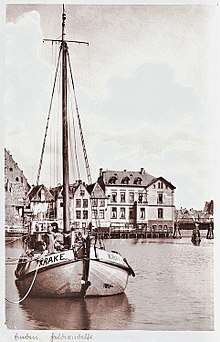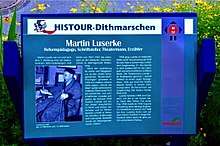Martin Luserke
Martin Luserke (3 May 1880 in Berlin, Germany – 1 June 1968 in Meldorf, Holstein, Germany) was a progressive pedagogue, a bard and writer.[1][2][3] He was one of the leading figures of German progressive education and a precursor of outdoor education.[4] As his distinguished achievement counts the integration of community theatre into school and youth work.[5] It was also integrated in German Youth Movement.[6][7]
Work


With his pupils of Freie Schulgemeinde Wickersdorf near Saalfeld, Thuringia, he started in 1906 to perform community theatre. His stage work was based on William Shakespeare.
In 1925 he founded Schule am Meer on Juist Island where he established the first and only theatre building of a German school.[8] The unique project primarily spanned a group of five school buildings which were planned in 1929 by Berlin-based architect Bruno Ahrends. The theatre was erected between 1930 and 1931. It was used for community theatre, the school's choir and the school's orchestra, conducted by composer Eduard Zuckmayer, the older brother of writer Carl Zuckmayer. When Luserke's renowned school was closed in spring 1934 due to Nazi Gleichschaltung (= Nazification) he decided to work as a free writer.
In the Netherlands he bought the old Dutch fishery vessel ZK 14 which he named Krake (= octopus). Henceforward he used it as his swimming poet's workshop to sail the shallow waters of the coastal regions of The Netherlands, Germany, Denmark, Norway and Sweden.[9] In the harbours he used the ship for taletelling and readings. Mostly young people visited his ship, some attended during trip sections.[10] One of the later well-known listeners and passengers was Beate Uhse.[11][12]
At the end of 1938 he went off board to settle in Meldorf, Holstein.[13] There he continued his work as a free writer.
His most successful books were published during the 1930s and 1940s. In 1935 he got awarded with Literaturpreis of Reichshauptstadt Berlin for his historic novel Hasko which was published in German, Dutch and French.[14] Several of his books were also printed for army postal service of German Wehrmacht (army and navy) during World War II. Luserke cannot be described as toeing the Nazi party line.[15] Instead he was close to Völkisch movement.[16] His work was mostly fiction with a revival of Norse mythology and Continental Germanic mythology so it contains no Nazi propaganda.[17] Nevertheless it matched some popular Nazi topics which was convenient during dictatorship to get accepted as a writer.
Between 1947 and 1952 he got a teaching assignment at Meldorfer Gelehrtenschule (founded in 1540) where he introduced his community theatre again.[18] There he named his fully developed play as Meldorfer Spielweise. Along the way his activities helped to save the school's survival which was endangered after WWII.[19]
Awards and Distinctions
- 1935 – 1st Prize of Literaturpreis of Reichshauptstadt Berlin for the novel Hasko (published in German, Dutch and French)[20]
- 1950 – Honorary Member of Schleswig-Holstein writer's assembly
- 1954 – Order of Merit of the Federal Republic of Germany for his community theatre work[21]
- 1958 – Friedrich Hebbel Award
- 1960 – University of Kiel Medal
- 1986 – As a permanent loan the state library of Kiel gave Luserke's furnishings to Heimatverein Juist. Since then it is exhibited in Sibje House on Juist Island.[22]
- 1987 – On 4 May a commemorative plaque was attached to his home at 37 Jungfernstieg in Meldorf[23]
- 2007 – Next to his home at Jungfernstieg in Meldorf a new commemorative plaque was installed[24]
Literature
- Martin Kiessig: Martin Luserke. Gestalt und Werk. Versuch einer Wesensdeutung. Dissertation Universität Leipzig 1936. OCLC 632234871
- Winfried Mogge (1987), "Luserke, Martin", Neue Deutsche Biographie (NDB) (in German), 15, Berlin: Duncker & Humblot, pp. 533–534; (full text online)
- M. von Kellenbach: Der Mensch in der Dichtung des Dritten Reiches (Hasko). Phil. Diss. 1939.
- Hans-Windekilde Jannasch: Martin Luserke zum 70. Geburtstag. Sammlung, Jan 1, 1950, Vol. 5, p. 377.
- Martin Luserke 75 Jahre alt. In: Bildung und Erziehung, 1955, Ausg. 8, Böhlau Verlag 1955, p. 299.
- Walter Jantzen: 50 Jahre Laienspiel – Gottfried Haaß-Berkow, Martin Luserke, Rudolf Mirbt. In: Bildung und Erziehung, 1956, Vol. 9, Böhlau-Verlag, Wien, Weimar, 1956, pp. 245–256.
- Jean Nordhaus: The Laienspiel Movement and Brecht's Lehrstuecke. Phil. Diss. 1969.
- Franz L. Pelgen: Das Laienspiel und die Spielweise Martin Luserkes. Dissertation Universität München, Philosophische Fakultät, München 1957.
- Herbert Giffei: Luserke, Martin. In: Schleswig-holsteinisches biographisches Lexikon, 1971, pp. 193-195.
- Anneliese Knoop: Martin Luserke. In: Lexikon der Kinder- und Jugendliteratur, Vol. 2 I–O, Klaus Doderer (Hrsg.), Beltz, Weinheim/Pullach/Basel 1977.
- Herbert Giffei: Martin Luserke und das Theater. Landesarbeitsgemeinschaft für Spiel und Amateurtheater in Nordrhein-Westfalen (Hrsg.), Vol. 18, Hilfen für Spielleiter. Doepgen, Bergheim 1979.
- Kurt Sydow: Die Lebensfahrt eines großen Erzählers – Martin Luserke (1880–1968). In: Jahrbuch des Archivs der deutschen Jugendbewegung 12, 1980.
- Herbert Giffei: Martin Luserke - Ein Wegbereiter der modernen Erlebnispädagogik. In: Wegbereiter der modernen Erlebnispädagogik, Vol. 6. Klaus Neubauer Verlag, Lüneburg 1987.
- Cornelia Susanne Anna Godde: Das Laienspiel als reformpädagogisches Element. Die Bedeutung Martin Luserkes für das heutige Bildungswesen (= Beiträge zu Erziehungswissenschaften, Vol. 3). Dissertation Universität Bonn. Wehle, Witterschlick / Bonn 1990, ISBN 3-925267-38-7.
- Jörg W. Ziegenspeck (Ed.): Martin Luserke. Reformpädagoge – Dichter – Theatermann; Gründer und Leiter der „Schule am Meer“ auf der Nordseeinsel Juist (1925-1934) (= Wegbereiter der modernen Erlebnispädagogik, Band 6). Neubauer, Lüneburg 1990, ISBN 3-88456-072-7.
- Brigitte Cléac'h: Martin Luserke und die Bretagne: Anfang einer Reise zur Sage auf der Insel Molène im Jahre 1905, Dissertation Université de Bretagne Occidentale, Mémoire de Maîtrise, Brest 1991. OCLC 838761494
- Nicole Becker: Reformpädagogik in der Weser-Ems-Region: das Beispiel „Haus am Meer“ von Martin Luserke Dissertation Universität Oldenburg 1993. OCLC 25681322
- Ulrich Schwerdt: Martin Luserke (1880-1968). Reformpädagogik im Spannungsfeld von pädagogischer Innovation und kulturkritischer Ideologie. Eine biographische Rekonstruktion (= Studien zur Bildungsreform, Vol. 23). Dissertation Universität Paderborn 1992. Lang, Frankfurt am Main u.a. 1993. ISBN 3-631-46119-4.
- Otto Seydel: Das Echo: Die Geschichte der Vision einer „Neuen Schule“. In: Bildung und Erziehung, 1994, Vol. 47(2). ISSN 0006-2456, pp. 175–186.
- Jürgen Oelkers: Eros und Lichtgestalten: Die Gurus der Landerziehungsheime (PDF file; 242 KB)
- Gunther Nickel / Johanna Schrön (Ed.), Carl Zuckmayer: Geheimreport. Wallstein-Verlag, Göttingen 2002. ISBN 978-3-89244-599-9.
- Albrecht Sauer: Martin Luserke. Reihe: The Oxford Encyclopedia of Maritime History. Oxford University Press, 2007. ISBN 978-0195130751.
- Luserke, Martin. In: Horn, Klaus-Peter / Kemnitz, Heidemarie / Marotzki, Winfried / Sandfuchs, Uwe (Ed.): Klinkhardt Lexikon Erziehungswissenschaft (KLE). Bad Heilbrunn 2012.
References
- ↑ Luserke, Martin. Deutsche Biografie (in German)
- ↑ Martin Luserke, in: Munzinger Archive (in German)
- ↑ Joan Campbell: Joy in Work, German Work: The National Debate, 1800-1945. Princeton University Press 2014. ISBN 978-1400860371, pp. 126–127 (citation: It seemed essential to remind people, that the post-revolutionary society must also meet the needs of the nation's intellectuals. This is what Martin Luserke, a popular novelist and educator, tried to do in an essay on work motivation published in 1919 as part of a series Praktischer Sozialismus („Practical Socialism“) edited by the philosopher Karl Korsch. Like Ruckhaber, Luserke thought it wrong to make a distinction between mental and physical labour. This led him to call for a „socialist“ ethic of work to replace the bourgeois-idealist one based on this distinction, which only helped to perpetuate the hierarchy of classes. Under socialism people of all walks of life would be taught to work for one another and to accept discipline in order to achieve common goals. Where Luserke chiefly differed from Ruckhaber is in his belief that intellectual work is hardly „work“ at all, but rather intrinsically pleasurable activity and therefore in some sense its own reward. As a result, he was not particularly concerned with improving the remuneration of intellectuals or cutting back on their hours of work. But he did think that workers of the mind needed special conditions if they were to serve society effectively. To make their different treatment acceptable to the majority of workers whose days were spent in hard, routine, labour, it was necessary to adopt the principle of meritocracy: in Luserke's utopia, examinations would be used to select the few needed for intellectual tasks, and these individuals would then be given non-monetary privileges and rewards, including the opportunity to experience joy in work.)
- ↑ Herbert Giffei: Martin Luserke - Ein Wegbereiter der modernen Erlebnispädagogik, in: Wegbereiter der modernen Erlebnispädagogik, Vol. 6, Klaus Neubauer Verlag, Lüneburg 1987.
- ↑ Mirona Stanescu: Vom Laientheater zur Theaterpädagogik. Ein historischer Werdegang der Theaterpädagogik in Deutschland. In: Neue Didaktik (2011) 1, pp. 11–29.
- ↑ Neue Deutsche Biographie, Vol. 15. Bayerische Akademie der Wissenschaften. Historische Kommission. Duncker & Humblot, Berlin 1987, ISBN 978-3-428-00196-5, p. 533.
- ↑ Ulrich Schwerdt: Martin Luserke (1880–1968). Reformpädagogik im Spannungsfeld von pädagogischer Innovation und kulturkritischer Ideologie. Eine biographische Rekonstruktion. Lang, Frankfurt am Main u. a. 1993, ISBN 3-631-46119-4, pp. 209–210, 232–233.
- ↑ Staatskommissar für die Regelung der Wohlfahrtspflege in Preußen: Schule am Meer, Juist – Antrag zur Sammlung von Geldspenden zugunsten eines Hallenbaus zur Verbesserung der kulturellen und sportlichen Ausbildungsmöglichkeiten (in German)
- ↑ Iris Hellmich: Auf den Spuren des Schriftstellers Martin Luserke. In: Emder Zeitung, Wochenmagazin, Reihe: Emder erzählen (127. Folge), 5 July 1997 (in German)
- ↑ Martin Kiessig: Die alte ZK 14. Zu Besuch auf einer schwimmenden Dichterwerkstatt. In: Martin Luserke. Gestalt und Werk. Versuch einer Wesensdeutung. Phil. Diss., Universität Leipzig, J. Särchen Verlag, Berlin 1936 (in German)
- ↑ Picture: Martin Luserke, Beate Köstlin (later married as Beate Uhse) and teacher Erne Wehnert aboard Krake
- ↑ Beate Uhse: Mit Lust und Liebe – Mein Leben. Ullstein, Frankfurt am Main/Berlin 1989. ISBN 3-550-06429-2, pp. 53–55.
- ↑ Dieter Luserke: Mit meinem Vater Martin Luserke an Bord des guten Schiffes KRAKE-ZK 14 (1988) (in German)
- ↑ Helga Mittelbauer: NS-Literaturpreise für österreichische Autoren. Eine Dokumentation. Böhlau Verlag, Wien 1994. ISBN 978-3205982043, p. 87.
- ↑ Edelgard Bühler / Hans-Eugen Bühler: Der Frontbuchhandel 1939–1945: Organisationen, Kompetenzen, Verlage, Bücher - Eine Dokumentation. Verlag Walter de Gruyter, Berlin 2002. ISBN 978-3-1109-3775-6, p. 27.
- ↑ Wilhelm Kühlmann (Ed.): Killy Literaturlexikon. Vol. 7, Kräm – Marp. De Gruyter, Berlin 2010, ISBN 978-3-11-022049-0, p. 575.
- ↑ Ernst Klee: Kulturlexikon im Dritten Reich – Wer war was vor und nach 1945. S. Fischer Verlag, Frankfurt am Main 2007, ISBN 978-3-596-17153-8, p. 346.
- ↑ Die Meldorfer Gelehrtenschule nach 1945 (in German)
- ↑ Peter Lambrecht, Henning Landgraf, Willi Schulz (Hrsg.): Meldorfer Gelehrtenschule 1540 bis 1990 – „Eine geine Schole vor de Joget des gantzen Landes“. Westholsteinische Verlagsanstalt Boyens & Co, Heide 1990. ISBN 3-8042-0500-3, pp. 289–295.
- ↑ Walter Killy: Literaturlexikon. Vol. 7, Kräm – Marp. Verlag Walter De Gruyter, Berlin 2010, ISBN 978-3110220490, pp. 575–576.
- ↑ Leopold Klepacki: Schultheater. Theorie und Praxis. Waxmann Verlag, Münster 2004, ISBN 978-3830914167, p. 58.
- ↑ Luserke, Martin – Mobiliar (in German)
- ↑ Die Meldorfer Gelehrtenschule nach 1945 (in German)
- ↑ Hartwig Lohmann, Vereinigung ehemaliger Schüler und der Lehrer der Meldorfer Gelehrtenschule e. V.
External links
| Wikimedia Commons has media related to Martin Luserke. |
- Private website of the Luserke family in Cologne, Germany (in German language)
